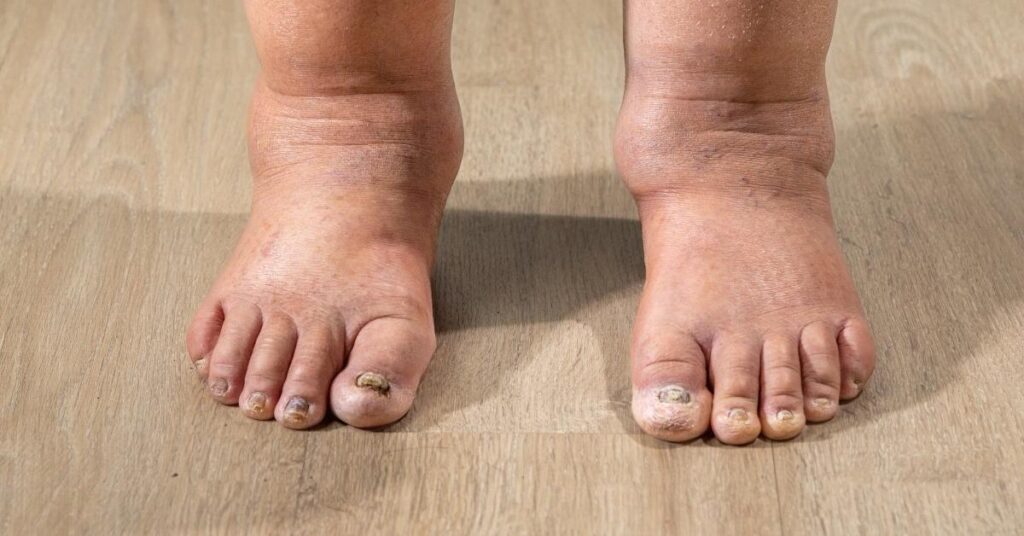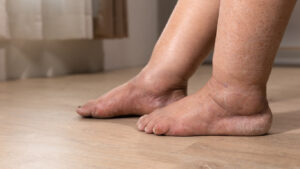Lymphedema is more than a physical condition. It’s a chronic challenge that can ripple through every aspect of a person’s life, from their self-image to their relationships. For those unfamiliar, lymphedema occurs when the lymphatic system, which helps drain fluid from tissues, becomes impaired, resulting in swelling, typically in the arms or legs. While the physical symptoms are visible, the psychological toll can be just as severe, if not more so. Imagine waking up every day to a body that feels foreign or worrying about how others perceive you because of something you can’t fully control. That’s the reality for many. This article dives deep into the emotional and psychological impact of lymphedema while also exploring practical coping mechanisms to help navigate this complex condition.
Understanding Lymphedema’s Emotional Weight
Living with lymphedema isn’t just about managing swollen limbs or wearing compression garments. It’s about carrying an emotional load that can feel overwhelming. The condition often comes with a sense of loss—loss of the body you once knew, loss of confidence, or even loss of the ability to do things you love without extra effort. For some, it’s the small moments that sting the most: catching a stranger’s curious glance or struggling to find clothes that fit comfortably. These experiences can erode self-esteem, leaving people feeling isolated and misunderstood.
The psychological impact varies from person to person, but it’s rarely insignificant. Studies suggest that up to 50% of people with lymphedema experience some form of emotional distress, ranging from mild anxiety to clinical depression. Why does this happen? The answer lies in the interplay between the body and mind. When your body changes in ways that feel out of your control, it’s natural to grapple with feelings of helplessness or frustration. Add to that the societal pressure to “look normal,” and it’s no wonder lymphedema can take a toll on mental health.
The Role of Body Image
Body image is a massive piece of the puzzle. Lymphedema can alter how someone sees themselves, often leading to a sense of disconnection from their own body. A swollen arm or leg might feel like it doesn’t belong, creating a mental tug-of-war between who you are and how you appear. For many, this sparks self-consciousness. Will people notice? Will they judge? These questions can loop endlessly, especially in social settings.
Women, in particular, may face added pressure due to cultural ideals of beauty that emphasize slimness and symmetry. But men aren’t immune either—society’s expectations of strength and physical capability can make lymphedema feel like a blow to masculinity. Over time, these feelings can erode confidence, making it harder to engage in social activities or even look in the mirror without discomfort.
Social Isolation and Stigma
Lymphedema doesn’t just affect the individual; it can reshape their social world. The visible nature of the condition can lead to awkward encounters, unsolicited questions, or even pitying looks. Some people with lymphedema describe pulling back from social events to avoid these situations. It’s not hard to see why, when every outing feels like a potential spotlight on your condition, staying home is the easier choice.
There’s also a stigma to contend with. Despite growing awareness, lymphedema is still misunderstood. Some assume it’s just “swelling” that can be fixed with diet or exercise, not realizing it’s a chronic condition with no cure. This lack of understanding can make people with lymphedema feel dismissed or invalidated, further deepening their sense of isolation.
The Mental Health Connection
It’s impossible to talk about lymphedema’s psychological impact without addressing mental health. The condition doesn’t just cause emotional discomfort—it can trigger or exacerbate serious mental health challenges. Anxiety and depression are common, often fueled by the chronic nature of the condition and the uncertainty it brings. Will it get worse? Will I be able to manage it? These questions can keep people up at night.
Anxiety and the Fear of Progression
Anxiety often stems from the unpredictability of lymphedema. The condition can flare up unexpectedly, and the fear of progression looms large. For some, every new ache or slight increase in swelling sparks worry about what’s to come. This hypervigilance can be exhausting, making it hard to relax or focus on anything else. Over time, it can lead to generalized anxiety, where the fear of “what if” overshadows daily life.
Depression and the Weight of Chronic Illness
Depression is another everyday companion. The constant management of lymphedema—encompassing compression garments, manual lymphatic drainage, and regular doctor’s visits—can feel like a full-time job. When you’re pouring so much energy into managing a condition that never seems to go away, it’s easy to feel defeated. For some, depression creeps in quietly, manifesting as low energy or a loss of interest in things they once enjoyed. For others, it’s a louder presence, marked by feelings of hopelessness or worthlessness.
The Role of Stress and Its Vicious Cycle
Stress is both a cause and a consequence of lymphedema’s psychological impact. The condition itself is stressful, but stress can also worsen symptoms, creating a vicious cycle. When you’re stressed, your body’s systems, including the lymphatic system, don’t function as efficiently. This can lead to increased swelling, which in turn ramps up emotional distress. Breaking this cycle is easier said than done, but it’s a critical part of managing both the physical and psychological aspects of lymphedema.
How Stress Affects the Body
Stress triggers the release of hormones, such as cortisol, which can disrupt the body’s balance and exacerbate inflammation. For someone with lymphedema, this can mean increased swelling or discomfort, which in turn exacerbates the stress response. It’s a feedback loop that’s hard to escape without intentional strategies to manage both the mind and body.
The Emotional Toll of Constant Management
The daily grind of lymphedema care is another stressor. Compression garments, while essential, can be uncomfortable and time-consuming to put on. Manual lymphatic drainage requires regular appointments or self-massage, which can feel like another chore. For many, the mental energy needed to stay on top of these tasks adds up, leaving little room for other aspects of life. This constant vigilance can lead to burnout, making it harder to cope emotionally.
Coping Mechanisms: Finding a Path Forward
The psychological challenges of lymphedema are real, but they don’t have to define the experience. There are ways to cope, rebuild confidence, and find joy despite the condition. The key is finding strategies that work for you—ones that address both the emotional and practical sides of living with lymphedema.
Building a Support System
One of the most powerful coping mechanisms is connection. Talking to others who understand lymphedema can be a game-changer. Support groups, whether in-person or online, offer a space to share experiences, vent frustrations, and learn from others. There’s something incredibly validating about hearing someone else say, “I get it.” Friends and family can also play a crucial role, but they may need guidance on how to provide adequate support. Being open about your needs—whether it’s a listening ear or help with daily tasks—can strengthen these relationships.
Therapy and Professional Support
Sometimes, talking to a therapist is the best way to navigate the emotional complexities of lymphedema. Cognitive-behavioral therapy (CBT) is particularly effective in addressing negative thought patterns, such as self-criticism or catastrophic thinking. A therapist can also help you develop coping strategies tailored to your specific challenges, whether it’s managing anxiety or rebuilding body image. If therapy feels daunting, even a few sessions with a counselor who specializes in chronic illness can make a difference.
Mindfulness and Stress Reduction
Mindfulness practices, like meditation or deep breathing, can help break the stress-swelling cycle. These techniques don’t require hours of commitment—just a few minutes a day can shift your mindset. For example, a simple practice like focusing on your breath for five minutes can calm your nervous system and reduce cortisol levels. Apps like Headspace or Calm offer guided meditations specifically designed for individuals with chronic illnesses, which can be a great starting point.
Journaling for Emotional Release
Journaling is another underrated tool. Writing about your feelings—whether it’s frustration, sadness, or even small victories—can help you process emotions and gain perspective. It’s not about crafting perfect prose; it’s about getting the thoughts out of your head and onto the page. Some people find it helpful to write letters to their lymphedema, expressing anger or acceptance as a way to externalize their feelings about the condition.
Redefining Body Image
Rebuilding body image is a journey, but it’s possible. One approach is to focus on what your body can do rather than how it looks. Maybe your swollen arm still lets you hug your kids tightly, or your legs carry you through a walk in the park. Celebrating these capabilities can shift the narrative from one of loss to one of gratitude. Another strategy is to curate your environment—surround yourself with people who lift you and avoid media that promotes unrealistic body standards.
Fashion as Empowerment
Clothing can also be a tool for empowerment. Finding garments that fit well and make you feel good can boost confidence. Some brands specialize in adaptive clothing designed for individuals with lymphedema, featuring adjustable straps or stretchy fabrics. Experimenting with styles that highlight your personality—such as bright colors and bold patterns—can be a way to reclaim your sense of self.
Physical Activity and Mental Health
Exercise, when tailored to lymphedema, can be a double win. It supports lymphatic flow, which may help reduce swelling, and releases endorphins that can lift your mood. Low-impact activities, such as swimming, yoga, or walking, are often recommended; however, the key is to find something you genuinely enjoy. Even gentle stretching can make a difference. Working with a physical therapist trained in lymphedema can ensure you’re moving in ways that support both your body and mind.
Setting Realistic Goals
Setting small, achievable goals can also counteract feelings of helplessness. Maybe it’s committing to five minutes of self-massage daily or trying a new hobby that doesn’t rely on physical ability. These goals don’t have to be grand—they need to remind you that you’re in control of some aspects of your life. Each small win builds momentum, reinforcing a sense of agency and empowerment.
The Power of Advocacy and Education
Advocacy is another way to cope. Learning about lymphedema and sharing that knowledge with others can be a powerful and empowering experience. It’s a way to take back control, to say, “This is my reality, and I’m going to own it.” Whether it’s educating friends about the condition or advocating for better healthcare resources, these actions can build confidence and reduce feelings of isolation.
Raising Awareness
Raising awareness doesn’t have to mean starting a movement. It can be as simple as correcting misconceptions when they arise or sharing your story on a blog or social media. These small acts can help shift how others perceive lymphedema, ultimately reducing the stigma over time. They also remind you that your voice matters, which is a powerful antidote to feelings of invisibility.
Connecting with the Lymphedema Community
The lymphedema community is vibrant and growing. Online platforms, such as the Lymphatic Education & Research Network or patient-led forums, offer resources and a sense of community. Engaging with this community—whether through attending webinars, participating in fundraisers, or just reading others’ stories—can remind you that you’re not alone.
Conclusion: Embracing the Journey
Lymphedema is a tough road, no question. Its psychological impact can feel like an invisible weight, shaping how you see yourself and interact with the world. But it’s not the whole story. By building a support system, exploring therapy, practicing mindfulness, and finding ways to redefine your body image, it’s possible to navigate emotional challenges and emerge stronger. The key is patience—with yourself, with the process, and with the ups and downs of living with a chronic condition. You’re not just managing lymphedema; you’re learning to thrive despite it.
FAQs
Q1: Can lymphedema cause depression?
Depression is common among people with lymphedema due to its chronic nature and impact on body image. Therapy and support groups can help manage these feelings.
Q2: How can I explain lymphedema to friends who don’t understand?
Please keep it simple: explain that it’s a condition where the lymphatic system fails to drain fluid properly, resulting in swelling. Share how it affects you personally to make it relatable.
Q3: Are there specific exercises that can help alleviate lymphedema and improve mental health?
Low-impact exercises, such as swimming or yoga, can improve lymphatic flow and boost your mood. Consult a lymphedema-trained physical therapist for personalized recommendations.
Q4: How do I deal with stares or questions about my lymphedema?
Prepare a brief response, like, “It’s a medical condition that causes swelling.” Redirect the conversation to something positive to maintain control of the interaction.
Q5: Is mindfulness effective for managing lymphedema stress?
Mindfulness helps reduce stress, which helps manage swelling and improve emotional well-being. Even a few minutes of deep breathing daily can make a difference.





